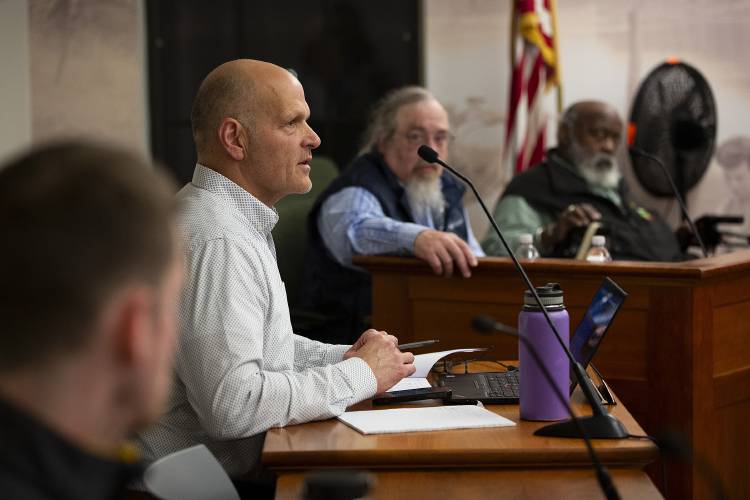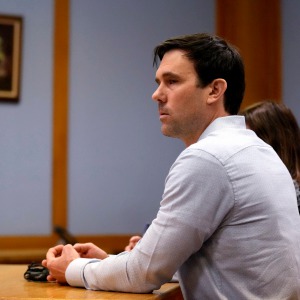Editorial: How many school superintendents does Hartford need?

Superintendent Tom DeBalsi speaks to parents during a Hartford School Board meeting at Hartford Town Hall in White River Junction, Vt., on Wednesday, Dec. 13, 2023. DeBalsi said that he has been spending time in the middle school following Bouvier’s departure and disagrees that it is “in chaos” despite concerns about bullying and safety that several parents expressed during the meeting. (Valley News / Report For America - Alex Driehaus) Copyright Valley News. May not be reprinted or used online without permission. Send requests to permission@vnews.com. Alex Driehaus
|
Published: 02-23-2024 9:31 PM
Modified: 02-26-2024 3:54 PM |
For several weeks this winter, Hartford School Board members seemed intent on demonstrating that tennis players aren’t the only ones who commit unforced errors. In the end, they narrowly managed to avoid a double fault.
We refer to the board’s highly unusual proposal, abandoned earlier this week, to pay two superintendents during the next school year: the long-time incumbent, Tom DeBalsi, who plans to retire at the end of the 2024-25 year; and a candidate to be named later. Wisely, the board suspended the search for a new superintendent earlier this week after the plan drew considerable push-back. It plans to resume the search next year.
Still, the whole episode raises the question, What were they thinking? We’re not sure exactly how that arrangement would have worked in practice and, from what we can discern, neither did the board. In one scenario, DeBalsi, who seems to be esteemed by both the board and school staff, would have concentrated on completing some special projects that he has begun, while the newcomer would have grasped the day-to-day reins. The board’s annual report to taxpayers assures them that, “There will be only 1 (one) Superintendent for the Hartford School District in July 2024!!!” Now we know which one: DeBalsi.
Even in normal times, paying two superintendent-level salaries would have seemed bizarre: $200,000 here, $200,000 there, and pretty soon you’re talking real money. But in a year of budgetary chaos unleashed by the Vermont Legislature, in which the board apparently will be asking voters to embrace a school budget that raises taxes by up to 18.5%, the plan constituted a budgetary death wish — especially with a $21 million bond issue for capital expenses also on the ballot.
Not helping its cause was the fact that the board had not spelled out any clear rationale for the two-superintendent-salary scenario, by specifically explaining the nature of the projects DeBalsi would be working on, how completing them would improve education in the district and whether they would not get done without him.
Nor did the board address the concern that having a new superintendent working in the shadow of a popular outgoing one was highly likely to blur lines of authority to the detriment of the new hire. Maybe it could have worked if the district hired from within. But at the very least it seemed likely to limit the pool of outside candidates who might apply, something that the firm the board hired to conduct the search had already warned about.
But the fact that the board came to its senses doesn’t necessarily undo all the damage — in particular, its refusal to allow a letter objecting to the plan, signed by 18 members of the district’s administrative council, to be read in public session at a recent meeting. As our colleague Christina Dolan reported, when one administrator tried to read it, board member Peter Merrill abruptly cut her off on the grounds that, “We are not here to be propagandized to.” After which the administrators walked out, which board chairman Kevin Christie characterized as “a little childish.” Perhaps, though, childishness is in the eye of the beholder.
Other objections cited by the board were that reading the letter aloud was too time consuming and that the issues it touched on were sufficiently sensitive that they might have to be raised in an executive session. For what it’s worth, we read it out loud ourselves. It took us about three and a-half minutes to get through it, and we found nothing there that would remotely justify consigning it to a closed session.
Article continues after...
Yesterday's Most Read Articles
Perhaps all’s well that ends well. But delivering a public snub in the fashion that the board did has the potential to do lasting damage to its relationship with the district’s key administrators and perhaps other school employees. It may have already done so.
Lessons to be drawn? Think through the implications of proposals thoroughly before making them. Take the time and make the effort to explain yourself and your plans to the public, especially when they represent a sharp departure from precedent. And don’t be prickly when objections are raised.

 Editorial: Parker parole a reminder of how violence reshapes our lives
Editorial: Parker parole a reminder of how violence reshapes our lives Editorial: Chris Sununu’s moral vacuum
Editorial: Chris Sununu’s moral vacuum Editorial: Gambling tarnishes America’s sporting life
Editorial: Gambling tarnishes America’s sporting life By the Way: A white nationalist’s many mistruths
By the Way: A white nationalist’s many mistruths
